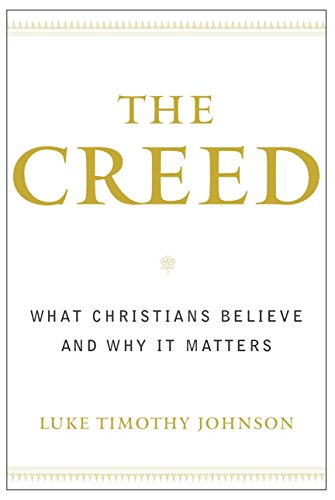This evening we are gathering to discuss “What the Creed is and What it Does” in Luke Timothy Johnson’s book, The Creed: What Christians Believe and Why It Matters. One of the issues Johnson brings up in this chapter is that the Creed addresses a subject matter which cannot be adequately expressed in any language. p.55. As Origen of Alexandria puts it, God isn’t merely unknowable or ineffable (inexpressible) but beyond unknowable and beyond ineffable. God, being the source of all being and existence, cannot rightly be said to “exist” or to be a “supreme being.” In speaking of “God,” we are faced with the task of putting into words that which is beyond words and beyond comprehension. Therefore, when we begin looking at the Creed, we have to begin with an infinite humility in our understanding and defining of the Divine because God transcends absolutely all meaning and all understanding. In transcending existence, God transcends all descriptions and characteristics that we ascribe to things that exist.
The question for the Church has always been how can we speak of God? For if we cannot speak of God, then for what purpose could the theologian write or even could the Scriptures teach? The short answer is that 1) we necessarily have to use the language we have (for how else can we communicate any idea), 2) that our language concerning God is always by analogy, and therefore, the words cannot be used or thought of in their ordinary sense and 3) that the words used will always be wholly inadequate. Therefore, we can describe God as light, a well, a shepherd, a bridegroom, or a rock but always knowing that these are imperfect analogies. And so in the Creed, God is “Creator” but not like a watchmaker, or God is called “Father” or “Son” but not in a human-gendered sense of those words. Analogies are like ice on an inclined hot surface, they can only take us so far before they run out, and so it is with the language of the Creed. (A good exercise in the inadequacy of our language is to try to describe the love you have for your spouse and then try to transfer that language to the infinite Love which is God.)
If you have time today, I would encourage you to read this blog post on how we can speak of God HERE. In the post, Fr. Robert Fortuin takes us through this limitation of language and thought in describing God. In terms of the Creed, Fr. Foutuin extensively quotes Gregory of Nyssa. Gregory was one of the “Cappadocian Fathers” along with Gregory of Nazianzus (whom Randy+ quoted on Sunday) and Basil the Great. These are the three men whose writing and whose attendance were instrumental at the Council of Constantinople (381) in coming up with the final language that became the Creed we use today. I have also attached excerpts from Oliver Clément’s Roots of Christian Mysticism (pp.26-34) and Jaroslav Pelikan’s The Christian Tradition, Vol II (pp.30-36) that also address this issue. These secondary readings will not be part of our discussion tonight, but they do provide a good background going forward in our study of the Creed and the limitations of our language and our comprehension.
Dinner is at 6. The menu is pork fried rice and spring rolls. Discussion about 6:45. Compline at 8. If you haven’t read, please come anyway. Hope to see you here.
May he grant you to be strengthened with might through his Spirit in the inner man, and that Christ may dwell in your hearts through faith; that you, being rooted and grounded in love, may have power to comprehend with all the saints what is the breadth and length and height and depth, and to know the love of Christ which surpasses knowledge, that you may be filled with all the fullness of God.
Ephesians 3:16-19

